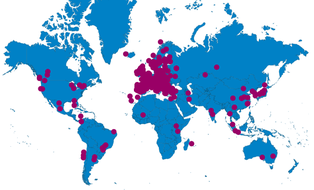Free movers
Would you like to study abroad in a country or at a specific faculty and can't find what you're looking for using Mobility Online? Or you have a specific institution abroad in mind where you would like to study for one or more semesters, but it does not have a cooperation agreement with TUD? This should not put a stop to your plans, because you can also study at foreign universities as a free mover.
Free movers organize their stay abroad independently. They do not have access to the same organizational help from the International Office as students who spend their semester abroad within the framework of special programs. However, if you would like help, you can contact agencies for many regions: Most of them offer their services free of charge and often have a broad portfolio of universities to work with. However, when working with agencies, you should be aware that you will usually have to pay tuition fees. It therefore makes sense to look around for scholarships at an early stage. If you are organizing your stay as a free mover, we have summarized a few pointers here to make it easier for you to get started.
Table of contents
Step 0: Quo vadis?
Get an overview and find out exactly which countries you are interested in. The DAAD country information is helpful here with valuable information about studying, the education system and admission requirements in the respective country and relevant contacts. The Federal Foreign Office is also an important source of information on entry requirements, the political situation and possible conflicts, as well as general information about the country. If you already have a rough destination in mind, which is perhaps outside Europe and a much further afield, it is also worth visiting a Center for Tropical and Travel Medicine (e.g. at Globetrotter on Prager Straße). There you can get free advice on health risks and preventative measures and receive the appropriate vaccinations.
Various factors play a role when choosing a university:
- The range of subjects on offer
- The languages offered (sometimes the language of the country and the language of instruction differ, so you can often get quite far with English - especially in Asia and Africa)
- Teaching quality and academic level (international comparison portals can be helpful, e.g. QS University World Ranking or Times Higher Education)
Step 1: Contacting the host university
Once you have decided on a university abroad, it's time to start planning. First contact the International Office of the host university. Here you should find out whether free movers are accepted at all (Japanese universities, for example, generally do not accept them). Also ask about the conditions and deadlines that must be observed for an application:
- Which certificates/documents do you have to submit?
- Which language certificates are valid (you may have to take a TOEFL test or an IELTS test)?
- Do you have to prove your achievements with a transcript of records? You can obtain an overview of your grades from your Examination Office; a TUD translator can do the certified translation for you - please allow at least 3 weeks for this).
- Does the host university require proof of sufficient insurance cover and financial means?
- Do you have to submit a health certificate?
- Are there any support programs for foreign students to obtain financial relief, e.g. with regard to tuition fees?
- How is student accommodation organized: Should/can you organize your own accommodation or are places in halls of residence offered (especially in Asian countries there is often no alternative to a hall of residence)?
Step 2: Clarify organizational and content-related issues with your home university
Clarify content-related questions with the subject coordinator at your faculty. Find out about courses at the host university and discuss with your local coordinator whether these are compatible with your study plan. You should find out from your Examination Office which documents you need to submit so that they can check whether the credits you have completed abroad can be recognized and credited (note the difference!). Consider whether it makes sense to take a semester off for the period of your stay abroad. You can apply for this at the Admissions Office.
Step 3: Financing
Long-term planning is worth its weight in gold! You sometimes have to apply for lucrative scholarships long before you apply for the actual place. If you want to spend a whole year abroad, the DAAD one-year scholarship is a good solution, but BAföG abroad is also worthwhile: up to €4,600 in tuition fees are covered here. Further funding opportunities can also be found on our website.
This guide should have given you an overview that will hopefully help you to structure yourself well and implement your plans in a targeted manner. We wish you
good luck and all the best for your studies abroad!
Contact
The International Office is happy to support you in organizing your stay as a free mover.
 © QS unisolution
© QS unisolution
Advice on studying abroad
NameMs Federica Serra
Infocenter/ Study abroad; TUDworldwide: America
Send encrypted email via the SecureMail portal (for TUD external users only).
Visiting address:
Fritz Foerster Bau, Office 161 Mommsenstraße 6
01069 Dresden
Postal address:
TUD Dresden University of Technology International Office
01062 Dresden
Office hours:
- Tuesday:
- 09:30 - 11:30
- 12:30 - 14:30
- Thursday:
- 09:30 - 11:30





